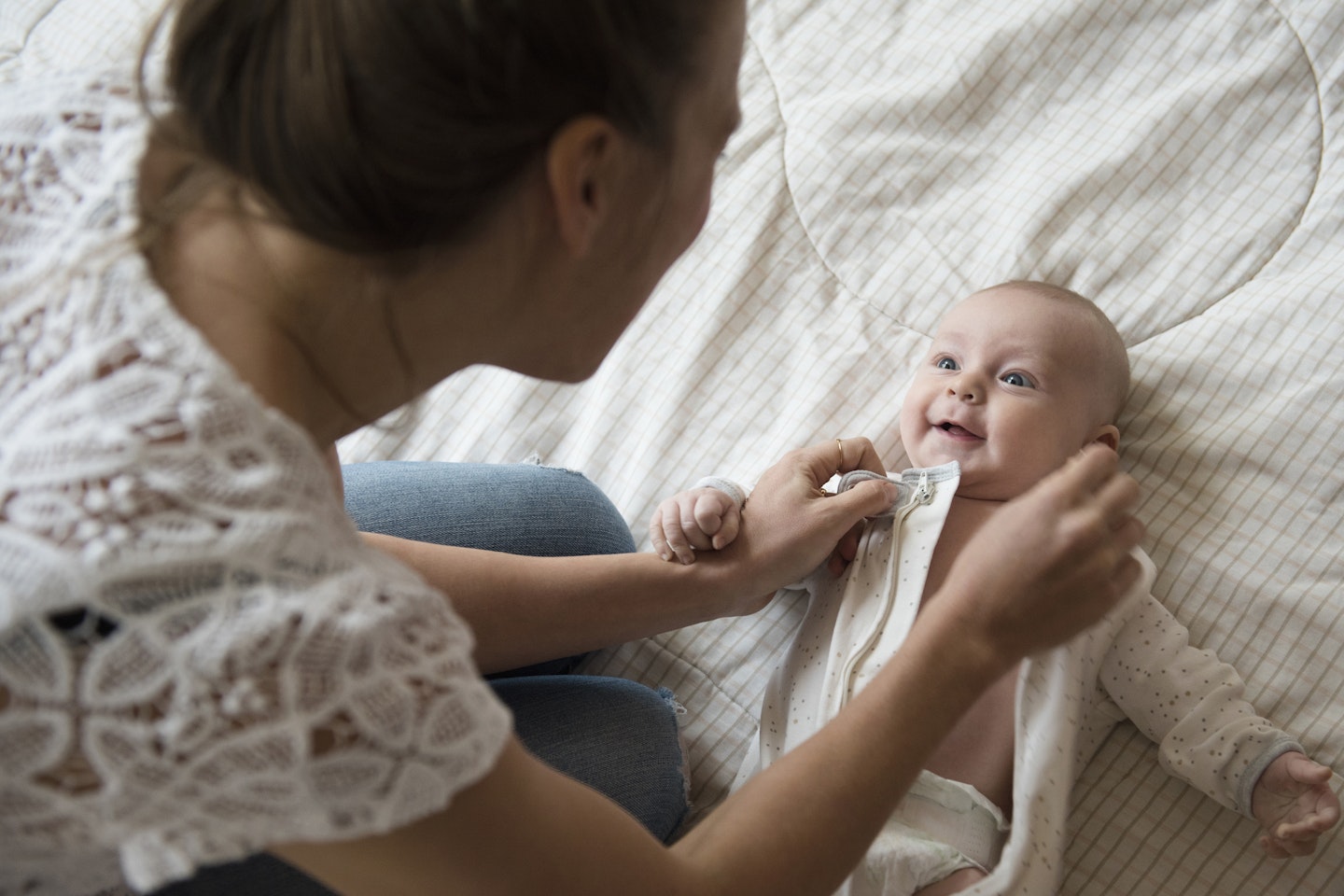Want your baby to be happy? Of course, you do! And while you’re right in thinking that his happiness levels are dependent on his personality, there are lots of things you can do to give your youngster an instant boost in the bliss stakes. And – here’s the really good news – adding these little bursts of pleasure into his everyday life can build your youngster’s natural ability to be happy.
‘There are two key kinds of happiness,’ explains Michelle de Haan, an expert in infant and child development. ‘One is the short-lived kind: the burst of pleasure your toddler gets when he’s whooshing through the air on a swing. The other is more deep-rooted – almost a personality trait – that comes from how he perceives and responds to the world.’ And for babies and toddlers, one kind of happiness often feeds into the other. ‘A major part of happiness in these early years comes from having a secure, trusting, loving relationship with your primary carers,’ says Michelle. ‘When babies have their needs met and are treated with love, they feel safe and confident. And then they’re able to explore and enjoy many pleasurable things!’
So, what are you waiting for? Add these happy, happy moments into your tot’s day…
Click on your little one's age from the list below to jump to the section you need advice with, plus genius tips to try at home!

Not sure if your newborn is happy? In the very earliest months, it is tricky. Very young babies have only a few ways to communicate how they’re feeling. ‘The only way you can really tell if your baby is happy is if he’s quiet and content or smiling,’ says Michelle. But if you could see inside his brain, you’d see a whole other story. Scans show that the ‘pleasure centre’ of the brain, the nucleus accumbent, lights up, with a feeling of happiness. This is an ancient part of our brain, which suggests we became attuned to seeking pleasure at an early stage in our evolution.
What to expect: your baby to start smiling on purpose from six to 10 weeks. You may hear him laugh from 14 weeks on and, from five months, he’s able to let rip with a big belly laugh if he finds something really funny.
How to make your tot happy
In his first few months, a lot of your baby’s pleasure comes from his interaction with you, his wonderful mama. ‘Even as newborns, humans have a strong need to form relationships,’ says Michelle. ‘We’re dependent on others to survive – so it’s important for babies to feel that sense of connection. We know that babies respond positively to responsive caregivers who are quick to meet their needs, and being fed, watered and warm is just the beginning. They want tender physical contact, like cuddling or baby massage, and seek out social contact, too.’

Game to play - Make sound surprises!
At this age, your baby doesn’t have advanced cognitive skills, and can only explore the world through his senses. He’s fascinated by new sounds, so get creative with your noisemaking and try these ideas…
-
Say ‘Boo!’ and open your eyes wide.
-
Do a high-pitched ‘atchoo!’. Draw out the ‘aaa…’ and make him wait for the ‘…choo!’
-
Slurp a lovely long slurpy slurp!
-
Make animal noises – not just dogs and cats but frogs and donkeys and buzzy bees as well.
-
Click your tongue against the roof of your mouth.
-
Talk through the empty cardboard tube from a kitchen roll. Sing through it too.
-
Blow extra-loud raspberries on his tummy.

‘When your baby is between six and 12 months old, he’s starting to become more active in his immediate environment,’ says Michelle. ‘He can sit up, he’ll start crawling, he may even reach the point when he’s pulling himself up and cruising. And at this stage, your baby will feel real pleasure in mastering each new motor skill.’ So, games that support these developing skills can bring a glowing sense of achievement, as well as that instant hit of pleasure.
What to expect: your tot to start figuring out what makes other people laugh between seven and 10 months, and to begin to reveal his own sense of humour. By his first birthday, he’ll be laughing at his own jokes.
How to make your little one happy
‘Watch your tot closely so you understand where he’s at skill-wise, and then encourage him to try something that’s a tiny bit harder,’ suggests Michelle. ‘So, if he’s gearing up to crawl, try putting his favourite toy just far enough away that he has to reach out – keeping his balance – and grab it. The trick is to be with him, to go at his pace and to encourage him to do something that’s just marginally more than he’s done so far. Too hard, and he’ll get frustrated. Too easy, he’ll get bored. But when you get it right and he achieves something new, he’ll get a wonderful sense of “Wow, I can do this!” which brings an instant feel-good payback.’

Game to play - 'Who’s that?'
Hold your tot facing outwards in front of a big mirror, and pull faces. He’ll instinctively copy you. Your youngster won’t know that the baby in the mirror is him until he’s around 18 months old, but he’ll love the fact that he’s building a relationship with the little fellow he sees reflected back at him!
12-24 months

‘During this year of your baby’s life he’s becoming aware of his own self-identity,’ says Michelle. ‘So, he’ll get pleasure from choosing things for himself and seeing what he wants within his environment.’ This is the age where he’ll be really busy building his very own sense of humour, too, you can expect to see him playing along with jokes. And because he’s big enough to understand what’s ‘normal’, anything silly will have him in stitches!
What to expect: your toddler to have learned the difference between joking, pretending and being literal. Clever!
How to make your tot happy
Use your youngster’s developing language skills to boost the pleasure he gets from having some control over his world. ‘Start asking him open-ended questions about what he’s enjoyed in his day,’ says Michelle. ‘So, at teatime or bathtime, you might say something like, “What did you enjoy most today?” or “How did you feel on the swings?” Your youngster might not have the vocabulary to answer those questions yet but, just by asking him, you’re showing that you’re interested in his opinions. And it’s the fact that you’re asking him rather than telling him that’s important. That subtle difference helps your child build his sense of identity and to feel another level of mastery about himself and how he relates to the world.’

Game to play - Whack-a-hat!
Put a clean nappy on your head and get him to knock it off, and make a funny face when he does. Be warned: he’ll want to do this way more times over than you do!

Now your tot understands what makes something funny, and increasingly wants to do things for himself and have an impact on what’s happening around him, it’s time for you to hand over the happiness baton to him. He’ll be very clear about what makes him happy at this age – and what doesn’t! So, if he initiates a pleasurable activity, join right in and let him take the lead. If he wants a cuddle, then let be the one who decides it’s time to end it. If he takes off his shoe and pretends it’s a mobile phone to try and make you laugh, follow suit! And if he shares something – anything! – be sure to stop for a moment and find pleasure in it, too.
What to expect: your tot to be inventing his own jokes during his second year. Move over Russell Howard!
How to make your tot happy
At this age, your tot might seem incredibly happy one minute but then be inconsolable the next – and that’s normal! ‘He understands more than he is able to express at this age,’ explains Michelle, ‘and he can get frustrated when he can’t make himself understood. Plus, he isn’t able to regulate his emotions at this age, and still needs your help to understand what he’s feeling. This is particularly true with nuanced emotions, like excitement, which can make him very happy, but can also tip over into a feeling more like stress or anxiety. The important thing in this year is, whenever possible, to give your youngster space to express himself and to talk about emotions, so he has words for the feelings inside. That will help him to process them and that will make him feel more in control.’

Game to play - Silly sock
Pop a sock on your hand to make a puppet. But this isn’t any old sock, this is Silly Sock. He’s going to get up to all sorts of mischief, and the only way to stop him is to puuuuuuull him off your hand. This is your tot’s job, obviously, and you need to look very relieved when he eventually catches Silly Sock and manages it. Your youngster will love laughing at the mischief the sock gets up to, but he’ll enjoy telling the puppet how he should behave, too – it’s a chance for him to demonstrate how much he understands about the world.
